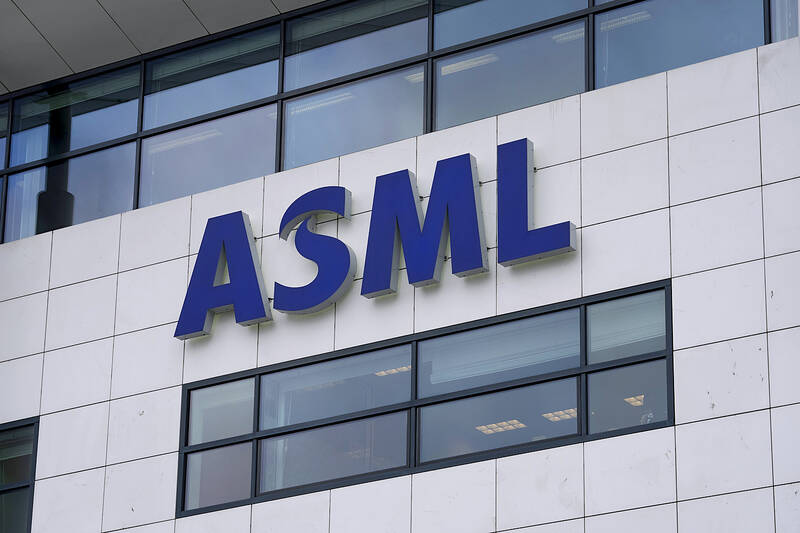Dutch tech giant ASML Holding NV on Wednesday warned of a steep fall in its China business next year, as it booked flat net profit in the third quarter compared with the same period last year.
“We expect China customer demand, and therefore our China total net sales in 2026, to decline significantly compared to our very strong business there in 2024 and 2025,” ASML chief executive officer Christophe Fouquet said in a statement.
The firm announced net profits of 2.13 billion euros (US$2.5 billion), after 2.08 billion euros in the third quarter of last year. Net sales in the third quarter came in at 7.5 billion euros. ASML had forecast a figure between 7.4 billion and 7.9 billion euros.

Photo: AP
“Our third-quarter total net sales ... were in line with guidance, reflecting a good quarter for ASML,” Fouquet said.
“We do not expect 2026 total net sales to be below 2025,” he said, adding that the firm would give more details on next year’s outlook in January.
“I think we have seen a flow of positive news in the last few months that has helped to reduce some of the uncertainties we discussed last quarter,” Fouquet said.
The CEO said he expected sales in the fourth quarter to come in between 9.2 billion and 9.8 billion euros, while for this year, the firm predicts a 15 percent increase in total net sales.
Net bookings, the figure most closely watched in the markets as a predictor of performance, reached 5.4 billion euros, compared with 5.5 billion in the second quarter.
According to a presentation posted on the firm’s Web site, sales to China represented 42 percent of ASML’s overall business in the third quarter, up from 27 percent in the second quarter.
“We have been experiencing a very high cycle in China, especially through ... the last couple of years,” ASML chief financial officer Roger Dassen said in a call with investors.
“Our expectation and the visibility we have right now is that next year we go back to more reasonable business,” he added.
Longer term, ASML said that the rapidly expanding artificial intelligence (AI) market would push up its annual sales to between 44 billion and 60 billion euros by 2030. It posted 28.3 billion euros in net sales last year.
ASML has faced growing pressure from US and Dutch export curbs for its most advanced chipmaking tools to China, as Beijing and Western nations are locked in a battle for the key sector.
Last week, a US Congressional committee report said that five companies, including ASML, had sold US$38 billion of critical tech to China last year, including to firms flagged as US national security threats.
“China is striving with all its might to build a domestic, self-sufficient semiconductor manufacturing industry,” the report said.

Taiwan’s rapidly aging population is fueling a sharp increase in homes occupied solely by elderly people, a trend that is reshaping the nation’s housing market and social fabric, real-estate brokers said yesterday. About 850,000 residences were occupied by elderly people in the first quarter, including 655,000 that housed only one resident, the Ministry of the Interior said. The figures have nearly doubled from a decade earlier, Great Home Realty Co (大家房屋) said, as people aged 65 and older now make up 20.8 percent of the population. “The so-called silver tsunami represents more than just a demographic shift — it could fundamentally redefine the

Businesses across the global semiconductor supply chain are bracing themselves for disruptions from an escalating trade war, after China imposed curbs on rare earth mineral exports and the US responded with additional tariffs and restrictions on software sales to the Asian nation. China’s restrictions, the most targeted move yet to limit supplies of rare earth materials, represent the first major attempt by Beijing to exercise long-arm jurisdiction over foreign companies to target the semiconductor industry, threatening to stall the chips powering the artificial intelligence (AI) boom. They prompted US President Donald Trump on Friday to announce that he would impose an additional

China Airlines Ltd (CAL, 中華航空) said it expects peak season effects in the fourth quarter to continue to boost demand for passenger flights and cargo services, after reporting its second-highest-ever September sales on Monday. The carrier said it posted NT$15.88 billion (US$517 million) in consolidated sales last month, trailing only September last year’s NT$16.01 billion. Last month, CAL generated NT$8.77 billion from its passenger flights and NT$5.37 billion from cargo services, it said. In the first nine months of this year, the carrier posted NT$154.93 billion in cumulative sales, up 2.62 percent from a year earlier, marking the second-highest level for the January-September

Asian e-commerce giant Shein’s (希音) decision to set up shop in a historic Parisian department store has ruffled feathers in the fashion capital. Anger has been boiling since Shein announced last week that it would open its first permanent physical store next month at BHV Marais, an iconic building that has stood across from Paris City Hall since 1856. The move prompted some French brands to announce they would leave BHV Marais, but the department store had already been losing tenants over late payments. Aime cosmetics line cofounder Mathilde Lacombe, whose brand was among those that decided to leave following